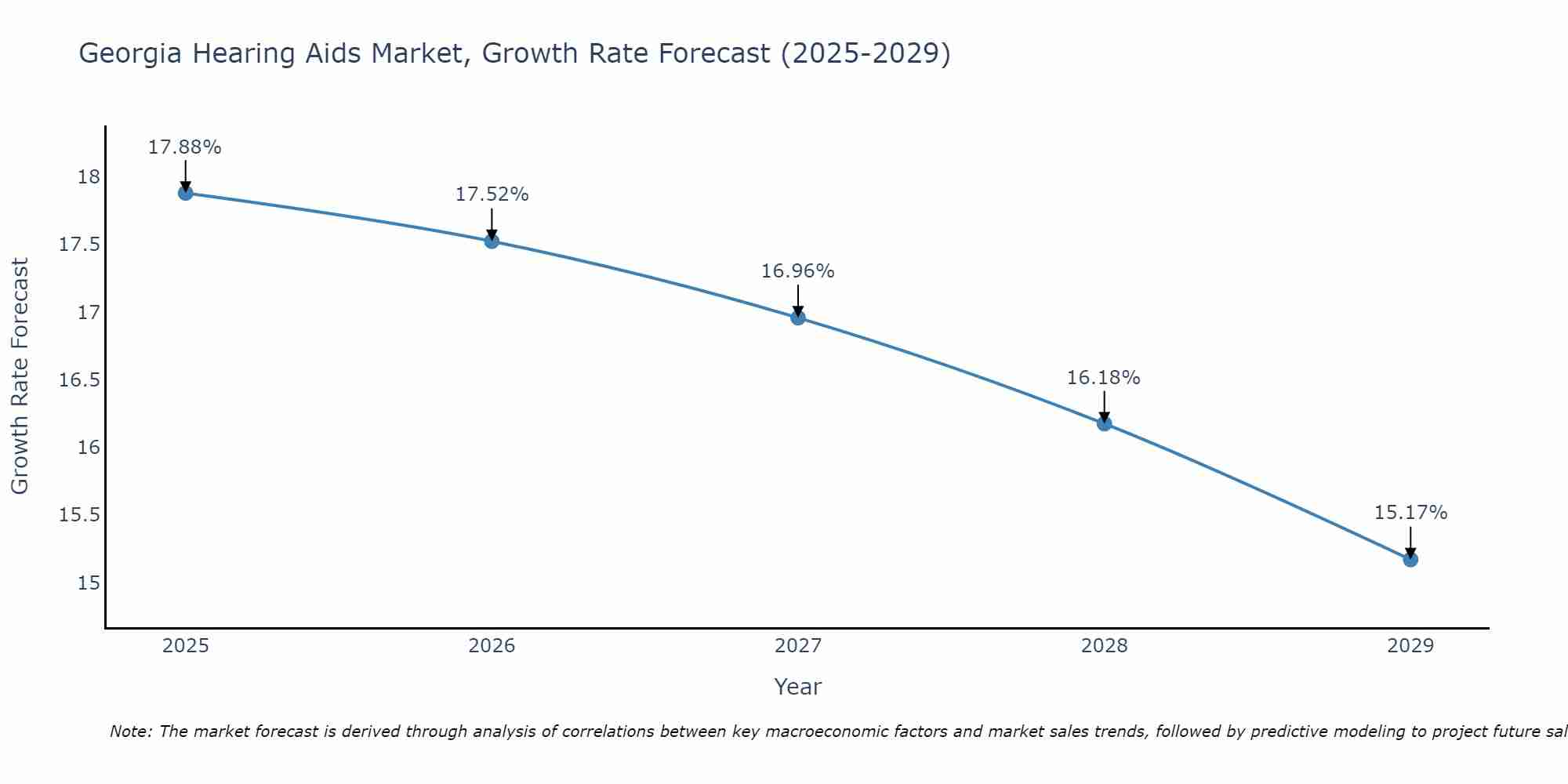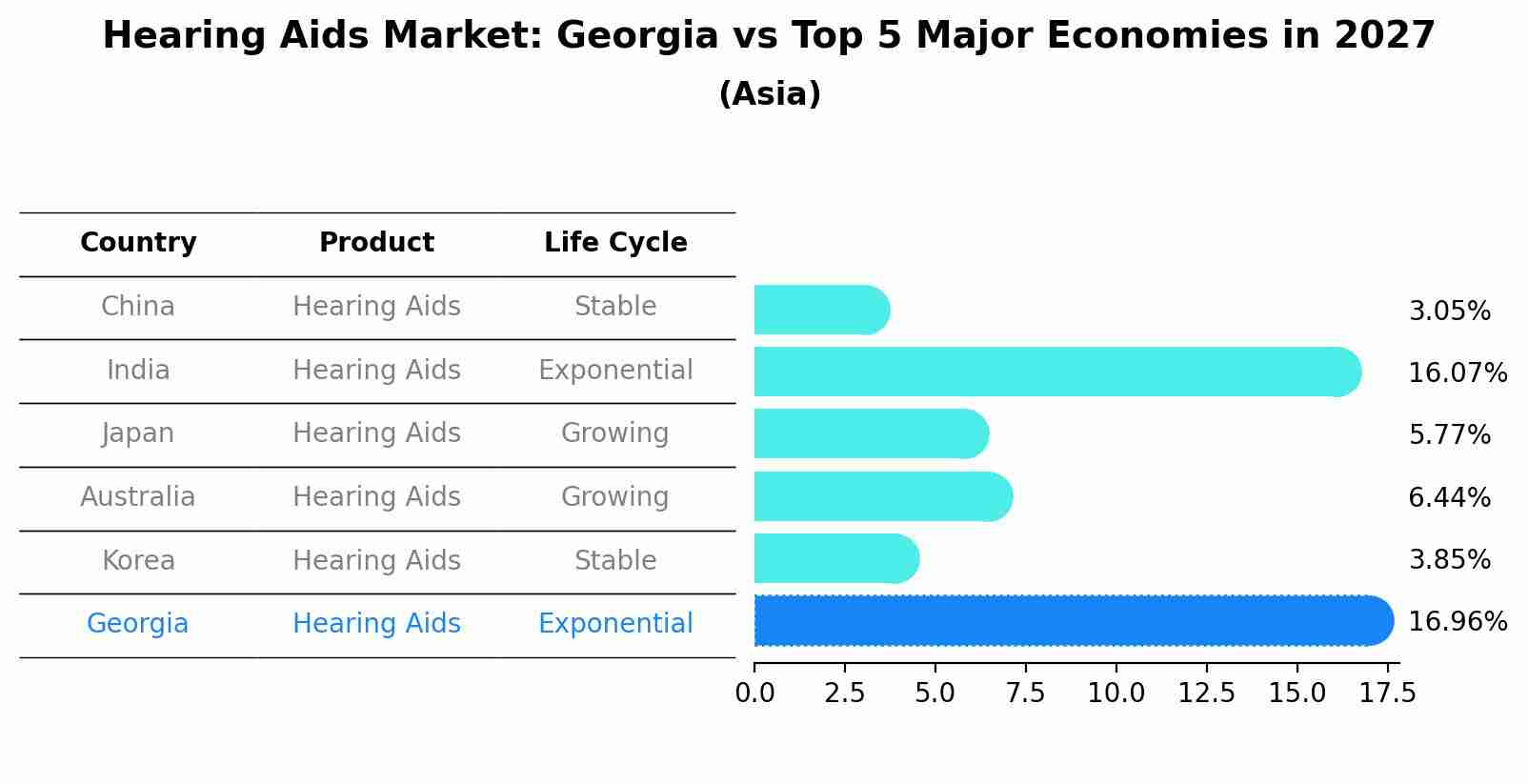Georgia Hearing Aids Market (2025-2031) Outlook | Size, Revenue, Industry, Forecast, Value, Analysis, Trends, Companies, Share & Growth
| Product Code: ETC364800 | Publication Date: Aug 2022 | Updated Date: Aug 2025 | Product Type: Market Research Report | |
| Publisher: 6Wresearch | Author: Sumit Sagar | No. of Pages: 75 | No. of Figures: 35 | No. of Tables: 20 |
Georgia Hearing Aids Market Size Growth Rate
The Georgia Hearing Aids Market could see a tapering of growth rates over 2025 to 2029. Although the growth rate starts strong at 17.88% in 2025, it steadily loses momentum, ending at 15.17% by 2029.

Hearing Aids Market: Georgia vs Top 5 Major Economies in 2027 (Asia)
Georgia's Hearing Aids market is anticipated to experience a exponential growth rate of 16.96% by 2027, reflecting trends observed in the largest economy China, followed by India, Japan, Australia and South Korea.

Georgia Hearing Aids Market Synopsis
The Georgia hearing aids market is experiencing steady growth due to an aging population and increased awareness about hearing health. Key players in the market include both local and national hearing aid providers offering a range of products catering to different hearing needs. Technological advancements such as Bluetooth connectivity and rechargeable options are gaining popularity among consumers. Factors driving market growth include the rising prevalence of hearing loss, government initiatives promoting hearing health, and the expanding network of audiologists and hearing healthcare professionals in the state. Additionally, increasing disposable income and the growing acceptance of hearing aids as a mainstream solution for hearing loss are contributing to the market`s expansion. Overall, the Georgia hearing aids market presents opportunities for innovation and market penetration for both existing and new entrants.
Georgia Hearing Aids Market Trends
The Georgia Hearing Aids Market is experiencing several key trends. One prominent trend is the increasing demand for advanced hearing aid technology, such as Bluetooth connectivity and rechargeable batteries, to enhance user experience and convenience. Another trend is the rising adoption of telehealth services for hearing aid consultations and adjustments, especially in response to the COVID-19 pandemic. Additionally, there is a growing focus on personalized hearing solutions tailored to individual preferences and lifestyle needs. Furthermore, sustainability and eco-friendly practices are becoming more important in the market, driving the development of hearing aids with longer lifespans and recyclable materials. Overall, these trends indicate a shift towards innovative, user-centric, and environmentally conscious hearing aid solutions in the Georgia market.
Georgia Hearing Aids Market Challenges
The Georgia hearing aids market faces several challenges, including limited access to specialized audiologists and hearing healthcare providers in rural areas, leading to disparities in service availability. Additionally, the high cost of hearing aids and lack of insurance coverage for many individuals present barriers to accessing necessary hearing healthcare. Competition from online retailers and direct-to-consumer models also pose challenges to traditional brick-and-mortar hearing aid providers in the state. Furthermore, the stigma associated with hearing loss and wearing hearing aids can prevent individuals from seeking help and treatment, further impacting the market growth. Overall, addressing these challenges through increased awareness, affordability initiatives, and improved access to services in underserved areas is crucial for the Georgia hearing aids market to thrive.
Georgia Hearing Aids Market Investment Opportunities
The Georgia Hearing Aids Market presents several promising investment opportunities due to the increasing demand for hearing aids among the aging population. Investing in hearing aid clinics or retail outlets that offer a wide range of hearing aid products and services could be lucrative. Additionally, there is potential for investment in innovative technology within the hearing aid industry, such as digital hearing aids or tele-audiology services. Partnering with audiologists or hearing healthcare professionals to provide comprehensive hearing solutions could also be a strategic investment opportunity. With the growing awareness of hearing health and the advancements in hearing aid technology, the Georgia market offers a favorable environment for investments that cater to the needs of individuals with hearing loss.
Jordan Agar Market Government Policies
The government policies related to the Georgia Hearing Aids Market primarily revolve around ensuring accessibility and affordability of hearing aids for residents. Georgia requires all hearing aid dispensers to be licensed and comply with regulations set by the Georgia Board of Hearing Aid Dealers and Dispensers. Medicaid in Georgia covers hearing aids for children under the age of 21, while the Georgia Division of Vocational Rehabilitation provides assistance for adults with hearing loss in obtaining hearing aids. Additionally, the state offers tax credits for individuals purchasing hearing aids. These policies aim to improve access to hearing aids for those in need, promote consumer protection through licensing requirements, and provide financial assistance to make hearing aids more affordable for residents of Georgia.
Georgia Hearing Aids Market Future Outlook
The Georgia Hearing Aids Market is poised for steady growth in the coming years due to several factors. The aging population, increased awareness about hearing health, and advancements in technology are driving the demand for hearing aids in the region. Additionally, the expanding availability of hearing healthcare services and the rising adoption of online sales channels are contributing to market growth. With a focus on innovation and personalized solutions, key players in the industry are expected to introduce new products and services to cater to the diverse needs of consumers. Overall, the Georgia Hearing Aids Market is forecasted to experience a positive trajectory, presenting opportunities for both existing and new players to thrive in this evolving market landscape.
Key Highlights of the Report:
- Georgia Hearing Aids Market Outlook
- Market Size of Georgia Hearing Aids Market, 2024
- Forecast of Georgia Hearing Aids Market, 2031
- Historical Data and Forecast of Georgia Hearing Aids Revenues & Volume for the Period 2021 - 2031
- Georgia Hearing Aids Market Trend Evolution
- Georgia Hearing Aids Market Drivers and Challenges
- Georgia Hearing Aids Price Trends
- Georgia Hearing Aids Porter's Five Forces
- Georgia Hearing Aids Industry Life Cycle
- Historical Data and Forecast of Georgia Hearing Aids Market Revenues & Volume By Product for the Period 2021 - 2031
- Historical Data and Forecast of Georgia Hearing Aids Market Revenues & Volume By In-the-Ear Hearing Aids for the Period 2021 - 2031
- Historical Data and Forecast of Georgia Hearing Aids Market Revenues & Volume By Receiver in-the-Ear Hearing Aids for the Period 2021 - 2031
- Historical Data and Forecast of Georgia Hearing Aids Market Revenues & Volume By Behind-the-Ear Hearing Aids for the Period 2021 - 2031
- Historical Data and Forecast of Georgia Hearing Aids Market Revenues & Volume By Canal Hearing Aids for the Period 2021 - 2031
- Historical Data and Forecast of Georgia Hearing Aids Market Revenues & Volume By Technology for the Period 2021 - 2031
- Historical Data and Forecast of Georgia Hearing Aids Market Revenues & Volume By Analog for the Period 2021 - 2031
- Historical Data and Forecast of Georgia Hearing Aids Market Revenues & Volume By Digital for the Period 2021 - 2031
- Historical Data and Forecast of Georgia Hearing Aids Market Revenues & Volume By Sales Channel for the Period 2021 - 2031
- Historical Data and Forecast of Georgia Hearing Aids Market Revenues & Volume By Retail Sales for the Period 2021 - 2031
- Historical Data and Forecast of Georgia Hearing Aids Market Revenues & Volume By Government Purchases for the Period 2021 - 2031
- Historical Data and Forecast of Georgia Hearing Aids Market Revenues & Volume By E-commerce for the Period 2021 - 2031
- Georgia Hearing Aids Import Export Trade Statistics
- Market Opportunity Assessment By Product
- Market Opportunity Assessment By Technology
- Market Opportunity Assessment By Sales Channel
- Georgia Hearing Aids Top Companies Market Share
- Georgia Hearing Aids Competitive Benchmarking By Technical and Operational Parameters
- Georgia Hearing Aids Company Profiles
- Georgia Hearing Aids Key Strategic Recommendations
Frequently Asked Questions About the Market Study (FAQs):
- Single User License$ 1,995
- Department License$ 2,400
- Site License$ 3,120
- Global License$ 3,795
Search
Related Reports
- Australia IT Asset Disposal Market (2025-2031) | Strategy, Consumer Insights, Analysis, Investment Trends, Opportunities, Growth, Size, Share, Industry, Revenue, Segments, Value, Segmentation, Supply, Forecast, Restraints, Outlook, Competition, Drivers, Trends, Demand, Pricing Analysis, Competitive, Strategic Insights, Companies, Challenges
- UAE Building Thermal Insulation Market Outlook (2025-2031) | Revenue, Companies, Share, Trends, Growth, Size, Forecast, Industry, Analysis & Value
- Portugal Electronic Document Management Market (2025-2031) | Strategy, Consumer Insights, Analysis, Investment Trends, Opportunities, Growth, Size, Share, Industry, Revenue, Segments, Value, Segmentation, Supply, Forecast, Restraints, Outlook, Competition, Drivers, Trends, Demand, Pricing Analysis, Competitive, Strategic Insights, Companies, Challenges
- France Electronic Document Management Market (2025-2031) | Strategy, Consumer Insights, Analysis, Investment Trends, Opportunities, Growth, Size, Share, Industry, Revenue, Segments, Value, Segmentation, Supply, Forecast, Restraints, Outlook, Competition, Drivers, Trends, Demand, Pricing Analysis, Competitive, Strategic Insights, Companies, Challenges
- Portugal Occupational Health & Safety Services Market (2025-2031) | Strategy, Consumer Insights, Analysis, Investment Trends, Opportunities, Growth, Size, Share, Industry, Revenue, Segments, Value, Segmentation, Supply, Forecast, Restraints, Outlook, Competition, Drivers, Trends, Demand, Pricing Analysis, Competitive, Strategic Insights, Companies, Challenges
- Netherlands Occupational Health and Safety Services Market (2025-2031) | Strategy, Consumer Insights, Analysis, Investment Trends, Opportunities, Growth, Size, Share, Industry, Revenue, Segments, Value, Segmentation, Supply, Forecast, Restraints, Outlook, Competition, Drivers, Trends, Demand, Pricing Analysis, Competitive, Strategic Insights, Companies, Challenges
- Belgium and Luxembourg Facility Management Market (2025-2031) | Strategy, Consumer Insights, Analysis, Investment Trends, Opportunities, Growth, Size, Share, Industry, Revenue, Segments, Value, Segmentation, Supply, Forecast, Restraints, Outlook, Competition, Drivers, Trends, Demand, Pricing Analysis, Competitive, Strategic Insights, Companies, Challenges
- Russia Women Intimate Apparel Market (2025-2031) | Strategy, Consumer Insights, Analysis, Investment Trends, Opportunities, Growth, Size, Share, Industry, Revenue, Segments, Value, Segmentation, Supply, Forecast, Restraints, Outlook, Competition, Drivers, Trends, Demand, Pricing Analysis, Competitive, Strategic Insights, Companies, Challenges
- Africa Chocolate Market (2025-2031) | Size, Share, Trends, Growth, Revenue, Analysis, Forecast, industry & Outlook
- Global Hydroxychloroquine And Chloroquine Market (2025-2031) | Industry, Trends, Size, Outlook, Growth, Value, Companies, Revenue, Analysis, Share, Forecast
Industry Events and Analyst Meet
Our Clients
Whitepaper
- Middle East & Africa Commercial Security Market Click here to view more.
- Middle East & Africa Fire Safety Systems & Equipment Market Click here to view more.
- GCC Drone Market Click here to view more.
- Middle East Lighting Fixture Market Click here to view more.
- GCC Physical & Perimeter Security Market Click here to view more.
6WResearch In News
- Doha a strategic location for EV manufacturing hub: IPA Qatar
- Demand for luxury TVs surging in the GCC, says Samsung
- Empowering Growth: The Thriving Journey of Bangladesh’s Cable Industry
- Demand for luxury TVs surging in the GCC, says Samsung
- Video call with a traditional healer? Once unthinkable, it’s now common in South Africa
- Intelligent Buildings To Smooth GCC’s Path To Net Zero













